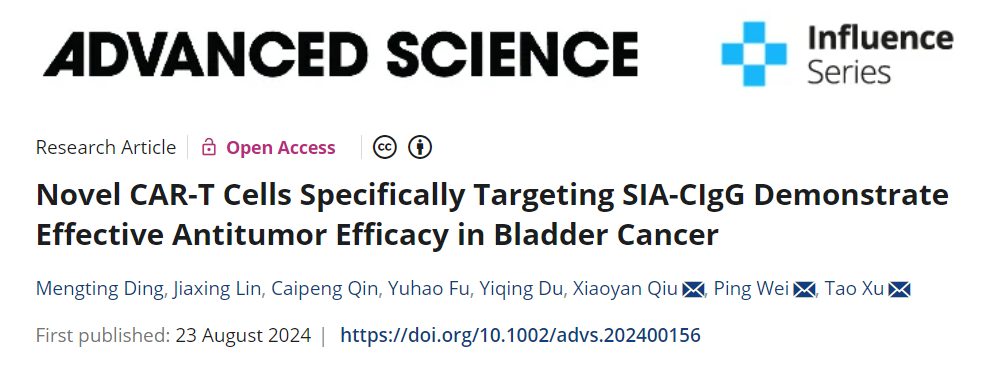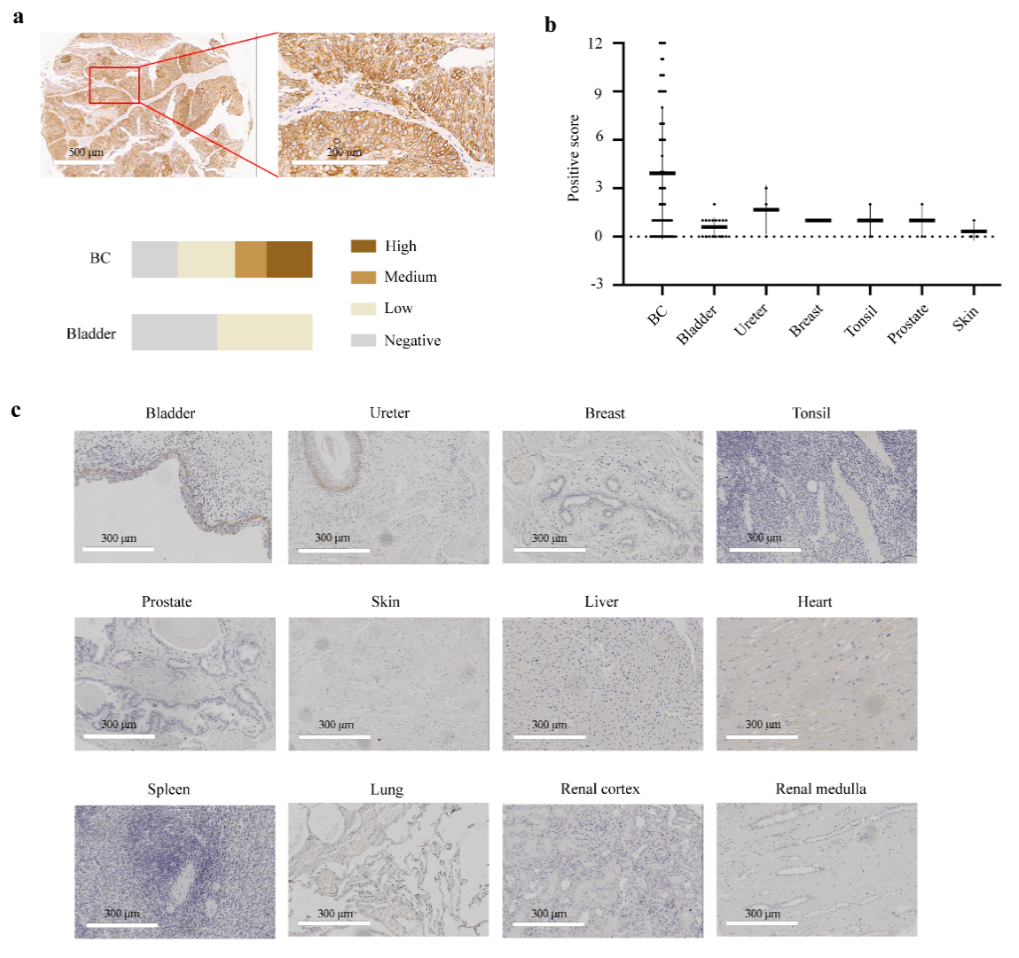
On August 23, 2024, the research team led by Wei Ping from the Center for Cell and Gene Circuit Design at the Institute of Synthetic Biology of the SIAT, in collaboration with the research team led by Xu Tao from the Department of Urology at Peking University People's Hospital and the team led by Qiu Xiaoyan from the School of Basic Medical Sciences at Peking University, published a research paper titled "Novel CAR-T Cells Specifically Targeting SIA-CIgG Demonstrate Effective Antitumor Efficacy in Bladder Cancer" online in Advanced Science. The study introduces a novel type of CAR-T cell that can specifically target SIA-CIgG-positive bladder cancer cells and demonstrate antitumor activity.

Screenshot of the article online
Link:https://onlinelibrary.wiley.com/doi/10.1002/advs.202400156
Bladder cancer is the tenth most common malignancy worldwide, with an increasing incidence. Chimeric Antigen Receptor T-cell (CAR-T) immunotherapy is a promising cancer treatment, but it has been less studied in bladder cancer due to the lack of suitable targets.
Bladder cancer is divided into non-muscle invasive bladder cancer (NMIBC) and muscle invasive bladder cancer (MIBC). NMIBC accounts for about 80% of bladder cancer patients, and the general treatment plan is transurethral resection of the bladder tumor followed by intravesical chemotherapy drugs (such as epirubicin) or Bacille Calmette-Guérin (BCG) instillation. Although NMIBC patients have a higher survival rate, they are prone to recurrence and require long-term monitoring. MIBC patients account for about 20% of cases, and the main treatment regimen involves radical cystectomy combined with cisplatin-based chemotherapy, resulting in a high mortality rate among these patients. In recent years, immune checkpoint inhibitors and antibody-drug conjugates have been approved for use in advanced urothelial carcinoma. Exploring new treatment options can improve therapeutic outcomes and patient prognosis. CAR-T immunotherapy is a promising cancer treatment, and exploring its application in bladder cancer is of significant importance.
Tumor-derived sialylated IgG (SIA-CIgG) is highly expressed in bladder cancer and is not expressed in most normal tissues, making it an ideal target for CAR-T cell therapy. Researchers constructed second-generation CAR-T cells using the single-chain variable fragment (scFv) derived from its monoclonal antibody and showed that these CAR-T cells could effectively lyse bladder cancer cells with tumor-killing specificity. Compared to CAR-T cells targeting human epidermal growth factor receptor 2 (HER2), which are currently undergoing clinical trials, SIA-CIgG CAR-T cells exhibited milder cytotoxicity and greater durability. Additionally, the study used multi-omics approaches, including transcriptome sequencing (RNA-seq) and chromatin accessibility sequencing (ATAC-seq), to analyze changes in SIA-CIgG CAR-T cells after repeated tumor antigen stimulation. The results showed activation of immune-related signaling pathways, enrichment of cytokine-receptor interactions, and changes in chromatin accessibility in stimulated CAR-T cells. Finally, researchers explored the effects of combining SIA-CIgG CAR-T cells with FDA-approved drugs and found that the histone deacetylase inhibitor—vorinostat—could enhance the ability of CAR-T cells to lyse tumor cells. This study suggests that SIA-CIgG-targeted CAR-T cells combined with vorinostat represent a promising novel treatment option for bladder cancer.
 Expression of SIA-CIgG in bladder cancer (BC) and normal tissues
Expression of SIA-CIgG in bladder cancer (BC) and normal tissues
Professor Wei Ping from the Institute of Synthetic Biology of the SIAT, Professor Xu Tao from the Department of Urology at Peking University People's Hospital, and Professor Qiu Xiaoyan from the School of Basic Medical Sciences at Peking University are the co-corresponding authors of the paper. Doctoral student Ding Mengting, Lin Jiaxing, and Associate Chief Physician Qin Caipeng from the Department of Urology at Peking University People's Hospital are the co-first authors of the paper. Doctoral student Fu Yihao from the Frontier Science Center for Interdisciplinary Studies at Peking University and Dr. Du Yiqing from the Department of Urology at Peking University People's Hospital provided significant assistance to the research. This study was supported by the National Key R&D Program and the National Natural Science Foundation of China.
The Research Team:
The Cell and Gene Circuit Design Center led by Researcher Wei Ping at the Institute of Synthetic Biology of the SIAT, focuses on developing new technologies, methods, and theories related to cell and gene therapy in synthetic biology. It is dedicated to the artificial design and quantitative analysis of cellular information processing systems, advancing engineering techniques in cell and gene circuit design, artificial cytokines and receptor design, and developing novel protein drugs and cell and gene therapies targeting solid tumors.